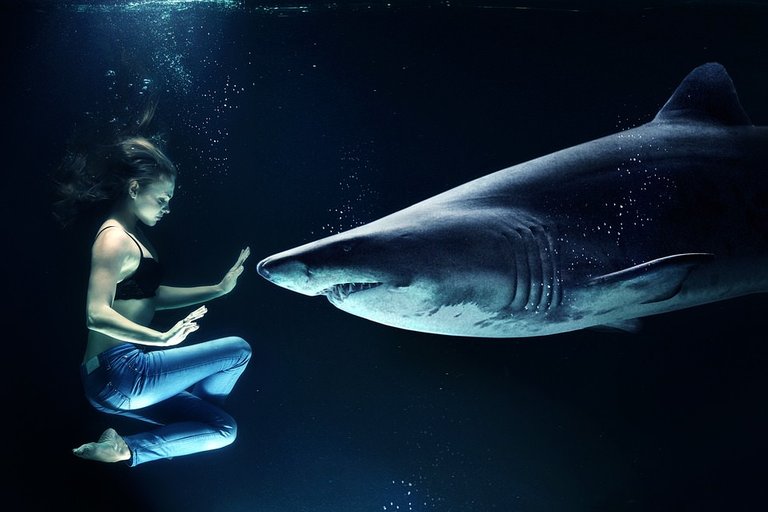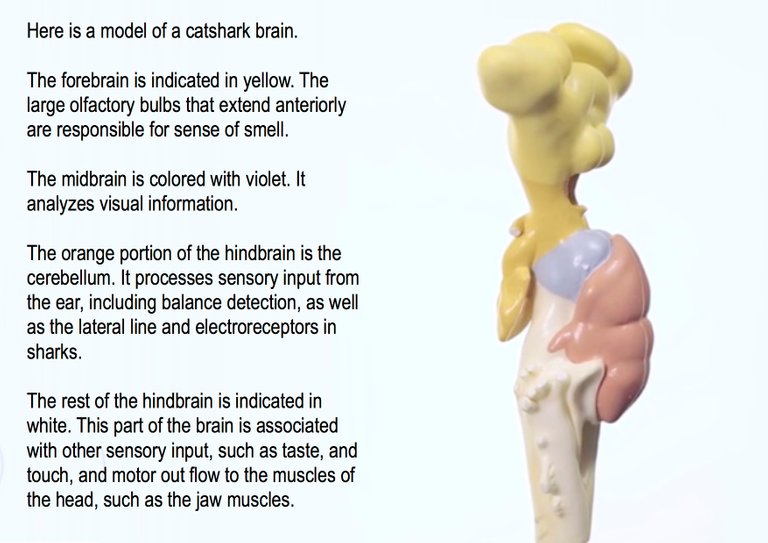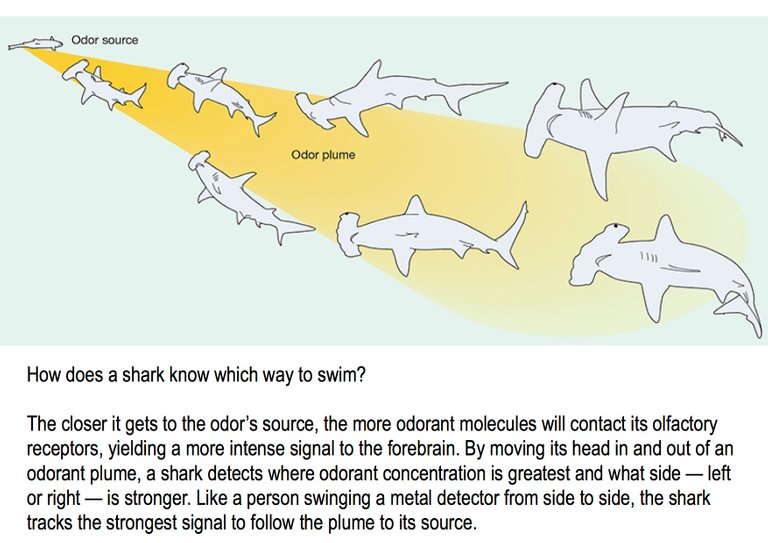
Maybe it is strange a bit to hear, but the shark’s brain and the human’s one have a lot in similar as well as senses.
In the beginning, let us consider the peripheral and central nervous systems of them to check these similarities.
All the information is on the basis of the online course «Sharks! Biodiversity, Biology and Conservation».
At first, the same as a human the shark has a central nervous system (CNS) consisting of the brain and spinal cord. The last one passes through the whole body in the vertebrae canal. It is understandable that CNS aim is to process sensory signals got from the body. For instance, if the temperature rapidly changes or an animal feels pain it will swim faster, as a human does removing a hand if touching something very hot.
It becomes more complicated when a creature has to analyze different information (eyesight, hearing, touch) and perform some action. A vivid example of it is when a shark is trying to catch a prey. Sensory inputs comes into the spinal cord on the dorsal side, whereas motor outflow exits the spinal cord ventrally. This is due to CNS that interprets this scheme which is reflected in the hindbrain.
It is interesting that sharks possess lateral line sense detecting water movements from the far and electroreception (e.g. ability to percept muscle contractions of other creatures) which people do not have. The peculiarity is that these two senses can only be carried by water, so during evolution when some vertebrates left water they lost them.
Here to complete the process a very important role is played by the peripheral nervous system which means nerves bringing signal to and from the CNS. More simple system structure is in the trunk and caudal areas of the shark’s body and it is more complicated in the head, known as cranial nerves.
SHARK’S BRAIN
Because sharks have more linear anatomical organization of the brain major sensory systems functions are clearly reflected in the head. It means that having a look at brain areas and their sizes one can discover a ot about shark’s behavior.
The parts of shark’s brain are connected with areas responsible for vision, olfaction and hearing.

Screenshot from the course
So looking at the brain parts that are larger it is possible to talk about the sensory world of the shark, such as deepwater sharks that rely on olfaction have enlarged forebrains to navigate for long and short distances.
HOW SMART IS A SHARK?
First of all it is worth to compare the brain size of different animals — ration between animal total and brain weight. In 1970’s Glenn Northcutt claimed that shark brain is comparable in size to that of many mammals.
There was one experiment made on self-recognition of animals. In a tank with manta rays they lowered a big mirror. Before when there was no mirror inside the rays passed the area in about 10 seconds, but with a mirror they spent about 6 minutes in that tank part continuously turning back. Scientists say that it is not possible to say that it was a sign of social interaction because one experiment showed that when a new individual was introduced into the tank with manta rays the white markings on their backs intensified very much. In case with a mirror nothing happened with the markings. So maybe the manta rays perceived the mirror reflection as themselves, who knows?!
One thing is sure — one cannot compare human intelligence with animal’s one.
SMELL
Perhaps, you know that sharks can smell even one blood drop in kilometers! It is sensational. Sharks olfactory system is very sensitive to amino-acids (building material for proteins).
Th illustration below shows hammerhead sharks following an odorant plume to its source.

Screenshot from the course
HEARING
Sharks are able to distinct from very low (10-20 hertz) to high (1100 hertz) frequencies. The inner ear is characterized by two chambers (sacculus and lagena) and has hair cells that define fluid movement by sounds.
EYESIGHT
In perfect water conditions sharks are able to see up to 10 m. This capability diminishes with the level of circumstances worsening. Sharks do not see colors and have one cone photoreceptor reacting to bright light and another one rod photoreceptor operating in dim light. Depending on the type the quantity of both kinds of receptors vary very much accomodating to living circumstances of an animal.

Screenshot from the course
TOUCH
It may sound strange but shaks usually touch its prey to determine whether it is eatable. Even in human/shark battle people who survived said that they had felt a strong bump before a shark started biting.
Why do they do that? By hitting an object a shark get information and texture and object resistance. It gives it tactile information. Then a shark may take an investigatory bite.

Screenshot from the course
TASTE
Taste buds are located in a shark’s mouth and sharks do feel the prey’s taste.
LATERAL LINE SENSE
Due to mechanosensors in the skin a shark can detect a struggling prey from far away.
ELECTRORECEPTION
This sense works best in the distance of about a meter when a shark feels muscle contractions of a prey.
Well, interesting that sharks have so many senses! More information about these amazing creatures in my new posts!
All pictures are under License CC0 unless indicated otherwise.
Wow....what an incredible post....i have Learnt a lot from this.
Thanks!
Sorry, now I indicated the pictures source.
Resteemed by @resteembot! Good Luck!
Curious?
The @resteembot's introduction post
Get more from @resteembot with the #resteembotsentme initiative
Check out the great posts I already resteemed.
Excellent post @crazy-daisy. I am not a big fan of sharks, the beach, boats, or the ocean but, I am a huge supporter of learning. This is one of the most well written and best designed informational posts ive read in a while. I like your layout style and the use of pics is not overwhelming. More people need to take note of your style and emulate it, myself included. I not only learned about sharks , I also learned about putting together a clean effective post . Great work, i think maybe crazy daisy is not so crazy. You have earned me as a new follower. I upvote and resteem good posts like this that deserve it. Keep em comin, Keep on Steemin on !!
Thank you very much for your comment! It is nice to hear that everything from you. I really take care not only of information, but about the design as well. I want all the data to be readable and well structured, so that one can easily percept paragraphs and quotes.
By the way, I am crazy in a positive meaning :) doing funny things and enjoying the life!